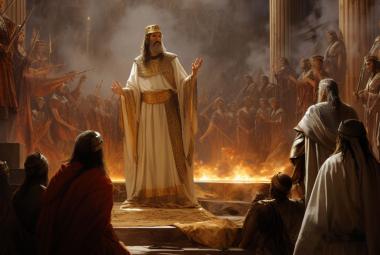How many of you are in the "full-time ministry?" If you are committed to the Lordship of Jesus Christ, you are, indeed, in the "full-time" ministry - whether you realize it or not. Consider this recruiting ad:
"Men and women wanted for difficult task of building Christ's church. You will often be misunderstood, even by those working with you. You will face constant attack from an invisible enemy, and often from those whom you consider partners. You may not see the results of your labor, and your full reward will not come until after all your work is completed. It may cost you your home, your ambitions, even your life."
Isn't that what you signed up for? You have the greatest "Boss" anyone could wish for, and this task is certainly the greatest challenge that anyone could commit their life to. Perhaps our proposed ad should also include:
"You will possess a worldwide mandate, and enjoy compelling advantages over all competition. You will be able to tap unlimited resources from your headquarters' support, and the retirement program is out of this world!"
And, of course, the key to effectiveness in any field includes special counsel from experienced mentors who have personally succeeded on the battlefield. Unquestionably one of the greatest minds ever to walk the earth, and who was unequaled in his effectiveness in ministry, was the Apostle Paul. You have in your possession his private letters counseling two of his closest protégés, Timothy and Titus. His letters to them are known as the "Pastoral Epistles," but they are not only for pastors: they are for every believer. We are all in a "full-time ministry" whether we recognize it or not.
Paul
Paul was not a provincial, unlettered fisherman. He had an educated international outlook: As a Roman citizen, he had a unique command of both Hebrew and Greek culture of history, religion, philosophy, poetry, science, music, etc. In addition to this background, he was also a Hebrew of Hebrews, born in Tarsus of Cilicia, and even tutored by Gamaliel in Jerusalem.
Paul was arrested in Jerusalem about the year 57 A.D., and was imprisoned in Caesarea for two years.1 Paul's voyage to Rome to be tried before Caesar started about September, 59 A.D. After a shipwreck and a three-month wait on Malta, he arrived in Rome about February 60 A.D.2 There he lived in his own rented house and had liberty to minister. (Ephesians, Philippians Colossians, and Philemon were written during this first Roman captivity.)
Paul was acquitted of the charges against him and released. During the two years that followed, he ministered in various places and wrote personal advice in his first letter to Timothy and one to Titus.
In about 65 A.D. Paul was arrested again, and this time put into a dungeon. Knowing that his end was near, he wrote a second letter to Timothy, his last letter.
Timothy
Timothy appears to have been one of Paul's most constant companions. He was the son of a Greek father and Jewish mother.3 Timothy was no doubt living at Lystra when Paul visited that city on his first missionary journey.4 He had earned a good reputation,5 thanks to his mother and grandmother,6 and Paul took him on as a promising protégé. Apparently certain prophetic utterances confirmed Timothy's appointment.7 Paul became like a spiritual father to the young man, referring to him as "my true son in the faith" 8 and "my dear son."9
Paul took him on as a companion and he became one of the apostle's most trustworthy fellow laborers.10 He also became Paul's faithful representative and messenger.11 Six of Paul's epistles include Timothy in the salutations.12 Timothy had become so dear to Paul that in the apostle's last message was a touching appeal for Timothy to join him in his final days of imprisonment.13
After being released from his first Roman imprisonment, Paul, with Timothy by his side, evidently revisited some of the churches in Asia, including Ephesus. On his departure from Ephesus, Paul left Timothy behind to provide leadership to the congregation. Then after an interval Paul wrote Timothy a letter, 1 Timothy, encouraging him on in that ministry.
Timothy, like many of us, seems to have been somewhat passive and easily intimidated,14 and Paul repeatedly spurred him into action.15 He was to let nothing, including his relative youth, stand in the way of his performance of duty.16 (Paul's exhortation "let no one despise your youth" was given 15 years later!17)
Yet, despite his gifts and his close association with Paul, Timothy was easily discouraged. Ephesus was not the easiest place to minister. (Are there any "easy" places?) The last time Paul had been with him, he had encouraged him to stay on at Ephesus and finish his work.18
Titus
While Timothy was laboring in metropolitan Ephesus, Titus was on the island of Crete, which was also not an easy place to work. To both of them Paul wrote, "Be faithful. It's too soon to quit." Titus was a Greek believer.19 He had served Paul on special assignments in Corinth.20 He, too, had been won to Christ by Paul (Titus 1:4). In fact, Paul wrote: "As for Titus, he is my partner and fellow worker among you" (2 Cor 8:23). Many are "fellow workers"; but few are really partners - fiduciaries. (See our briefing package, Being Faithful in a Faithless World.)
Your Challenge
Times are changing, and it is becoming increasingly "politically incorrect" to be a Bible-believing Christian. We could very well be facing some dark times ahead and this personal counsel and management advice may well have more import to each of us than might appear on the surface.
If you are really serious about the mandate that your Lord has given you, I would like to encourage you to undertake a serious study of these three letters. They will help you in ways that will prove astonishingly relevant to the very challenges facing each of us in these strange days. I believe that the Holy Spirit may have a special message for you personally in each of these overlooked resources.
Notes:
- Acts 21:19 - 26:32.
- Acts 27-28.
- Acts 16:1. No mention is made of his father being a Christian, but his mother Eunice and grandmother Lois were both known for their sincere faith (2 Tim 1:5).
- Acts 14:6; 16:1.
- Acts 16:2-5.
- Cf. 2 Tim 3:15.
- 1 Tim 1:18; cf. 4:14.
- 1 Tim 1:2.
- 2 Tim 1:2; cf. Phil 2:22.
- Cf. Rom 16:21; 1 Cor 16:10; Phil 2:19-23; 1 Thess 3:2.
- Acts 19:22; 1 Cor 4:17; 2 Cor 1:19; Phil 2:19; 1 Thess 3:2, 6.
- 2 Cor. 1:1; Phil 1:1; Col 1:1; 1 Thess 1:1; 2 Thess 1:1; Phi 1.
- 2 Tim 1:4; 4:9, 21.
- Cf. 2 Tim. 1:7.
- 1 Tim 1:3; 4:11; 5:7; 6:2; 2 Tim 3:14; 4:2, 5.
- 2 Tim 2:1-7; 4:5.
- 1 Tim 4:12.
- 1 Tim 1:3.
- Gal 2:3.
- 2 Cor 7:13-14; 8:6, 16, 23; 12:18.






